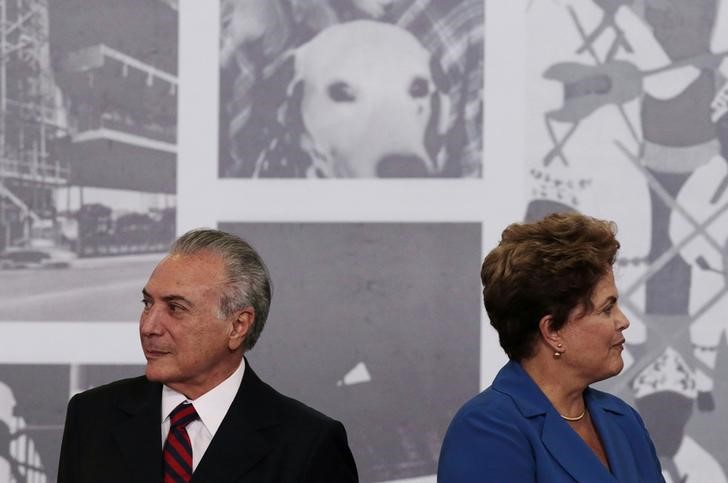By Alonso Soto
BRASILIA (Reuters) – A restive Congress and fallout from a weak economy will likely limit the ability of Brazil’s new President Michel Temer to rush through spending cuts and the welfare reforms investors had hoped to see soon after the removal of his leftist predecessor. The Senate’s dismissal of President Dilma Rousseff on Wednesday cleared the way for Temer, interim president since May, to push through fiscal reforms to close a yawning budget gap that cost Brazil its investment grade credit rating in 2015. But that momentum could be short-lived as Temer’s business-friendly agenda faces an uphill battle, his economic advisers and senior lawmakers told Reuters.
Ideological divisions and political rivalries within Temer’s 22-party alliance could jeopardize the approval of reforms, while high unemployment and expectations of a fragile economic recovery have policymakers wary of a deeper austerity push. “There is no consensus within the government alliance on any of these austerity measures,” said Raimundo Lira, a senior senator with Temer’s Brazilian Democratic Movement Party (PMDB). “Some parties want to move faster while others want to move slower and we need to find the right balance.” After replacing Rousseff in May, when she was suspended to stand trial on charges of breaking fiscal rules, Temer won over investors with promises to end years of interventionist policies, sell government assets and stabilize public debt. Brazil’s Bovespa stock index <.BVSP> and real currency However, Temer has come under fire from investors and some allies for watering down austerity measures to garner support for Rousseff’s ouster, including pay increases for an array of public servants. Lawmakers from the Brazilian Social Democracy Party (PSDB), Temer’s main ally in Congress, are among the loudest voices in favor of austerity.
Brazilian assets seesawed on Wednesday as PSDB legislators slammed leading senators from Temer’s PMDB for backing a measure that allowed Rousseff to retain the right to hold public office.
Aecio Neves, leader of the PSDB, denied any prospect of a split in the coalition but called for the government to make good on its promises to push through austerity measures.
A high-profile test for the ruling coalition in the days ahead will be a vote on a hefty wage hike for Supreme Court justices, backed by Temer’s party but opposed by the PSDB.
NO NEW MEASURES
Temer’s own advisors are resisting deeper budget cuts and tax increases to quickly rebalance the accounts as they try to avoid suffocating an incipient recovery. A draft 2017 budget presented on Wednesday relied largely on privatizations and an uptick in economic growth to raise tax revenues and narrow a budget deficit. Congress is expected to vote in the coming week on bills to increase private participation in the aviation and oil industries while the government is drafting plans to launch an infrastructure concession program and sell state enterprises. Temer also plans to submit this month his controversial pension reform, likely raising tensions with powerful groups such as the military, public school teachers and police officers.
Labor unions, some who support Temer, have vowed to protest any changes to one of the world’s most generous pension systems. Pushing through these reforms is ambitious enough, Temer’s aides say. “No new measures are planned beyond what we already announced,” said one adviser who asked for anonymity because he is not allowed to speak publicly. “Temer will maintain the pace of the fiscal adjustment.” Some members of the PSDB have taken aim against Finance Minister Henrique Meirelles for being too soft in pushing austerity.
Meirelles, a former central bank governor who is considered an architect of Brazil’s economic boom of the last decade, is seen as a potential rival for PSDB candidates for the 2018 presidential elections. “I hope that after the vote Meirelles will be zealous with the public accounts,” Senator Jose Anibal said on the sidelines of the impeachment trial in the senate. “You cannot make more concessions.” Anibal and other PSDB leaders told Reuters tensions have subsided and Temer has promised to focus on fiscal adjustment in the two remaining years of his term.
On the other end of the spectrum are several smaller centrist parties voicing concerns over the reforms and planning to propose changes to avoid social spending cuts.
At the heart of Temer’s reform agenda is a proposal to limit public spending growth for up to 20 years aimed at cutting a budget deficit that has tripled in less than a decade.
Allies are considering lowering the lifetime of that measure to four years or less, altering the indicator used to limit spending growth and allowing extra health and education spending.
For the head of the Lower House commission debating the amendments, Danilo Forte, changes are inevitable but he believes lawmakers are focused on resolving the budget crisis.
A return to economic growth will help the adjustment by increasing tax revenues, said Forte, a member of the Brazilian Socialist Party (PSB).
“You can’t just force a fiscal adjustment,” he said. “That doesn’t work in Brazil as we have seen in the past.”
(Reporting by Alonso Soto; Editing by Meredith Mazzilli)
After Rousseff ouster, Brazil’s Temer faces challenges to austerity

By Alonso Soto
















